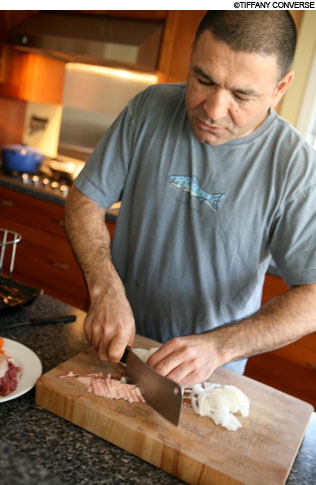
PREP WORK Momen Abdullayof chops the ingredients for his Uzbek one-pot feast. Photo: TIFFANY CONVERSE |
A friend told me I had to cook with her friend, Momen Abdullayof. He’s from Uzbekistan, a country I would have been really lucky to fill in correctly on a geography test. Uzbekistan borders Afghanistan and four other countries I can’t rattle off, all ending in –istan. Momen says his homeland is about the size of Maine, an eight- to 10-hour drive border to border. But that’s pretty much where the similarities end. Here we cook with olive oil. There they use cottonseed oil. His brothers, recently visiting the United States for the first time, ogled his pots and pans and his water faucet. Where they live houses have just one pot and no running water. Momen recalled his brothers guffawing as they opened his cabinets and drawers. “What do you need this — an electric slow cooker?” and “You live a hundred years advanced from us” and “This house is beyond my imagination.”
He shows me just what kind of magic Uzbeks can do with a single pot they call a kawzan, a large cast-iron wok with a lid. He calls his favorite dish osh: a slightly chewy mixture of lamb nuggets and white rice flavored with fried lamb fat, browned onions, lamb bone, cumin, raisins, a head of garlic left whole, and a huge pile of julienned carrots. He cooks by eye, scooping rice with a pint glass, not even measuring the rice water. You can make this vegetarian, or use chicken or beef, he says. Already, I see the number of dishes I can make with just one pot multiplying.
Momen corrects my impression that he and his brothers suffered for their lack of what I consider necessities. “Suffering is no food to eat, no clothes.” So they didn’t have a telephone. They’d run to their aunt’s house to invite her to dinner, and have tea with her before returning. So they didn’t have a car. “Horses, donkeys, bicycles, that’s fine.” The photographer and I looked at each other thinking: sounds kind of nice. But then Momen tells us Uzbekistan is one of the five most dangerous countries to visit. I don’t think Momen’s brothers entertained the idea of living here so one day they could use an electric slow cooker. Organized crime is rampant in Uzbekistan, and as Momen said, “you cannot question the government’s decision.” I balked at asking what would happen if you did.
When he arrived here as a 22-year-old refugee in 1987, Momen did not know A from B, and owed $400 to the organization that bought his plane ticket here. He took English classes at Portland Adult Education and got his first job at a Cumberland Farms gas station. After that he measured beans at the B & M Baked Beans factory. Today, he’s a pharmacist at Rite Aid, a husband and father, and living in a house that’s enviable by my standards. “You can do it,” he says. “You have to have determination to work hard to make things better.” But what is “better,” we wonder after the meal, as our country is divorcing, depressing, stressing, and blimping out. A long walk to an aunt’s house sounds about right, while texting healthy criticisms of those in power. We’ll invite her for osh the next day, served with crispy cucumbers, tomatoes, and lettuce.
Visit Immigrant Kitchens for the recipe and how-to photos. Lindsay Sterling can be reached atlindsay@lindsaysterling.com.